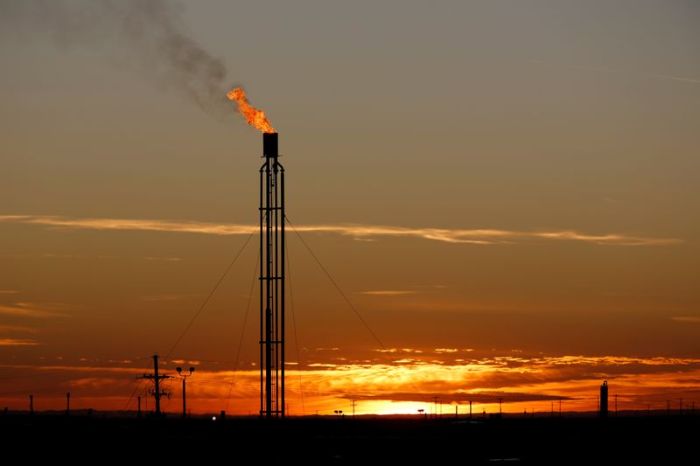NEW YORK (Reuters) – Oil prices dropped on Monday, with Brent slipping from a five-month high as global demand remained below pre-COVID levels while U.S. production edged up.
Brent crude futures settled at $45.28 a barrel, down 53 cents, or 1.2%. U.S. West Texas Intermediate crude <CLc1> settled at $42.61 a barrel, down 36 cents, or 0.8%.
Brent still closed out August up 7.5% for a fifth successive monthly price rise. WTI logged a fourth monthly gain at 5.8% after hitting a five-month high of $43.78 a barrel on Aug. 26 when Hurricane Laura struck.
Still, with key economies around the world limply recovering from coronavirus lockdowns, analysts said the market could remain oversupplied with fuel.
“The issues over demand just aren’t showing signs of any real improvement,” said John Kilduff, partner at Again Capital in New York.
At the same time, U.S. oil production climbed 420,000 barrels per day in June to 10.44 million barrels a day, the U.S. Energy Information Administration said, putting further pressure on prices.
Oil output in the U.S. Gulf Coast was lower as energy companies continued efforts to restore platforms and refineries shut before two storms struck last week.
“There is still some concern about the lagging effects of Hurricane Laura and what that’s going to mean for refinery operations as well as the impact on demand and exports,” said Phil Flynn, senior analyst at Price Futures Group in Chicago.
The U.S. Department of Energy said the West Hackberry Strategic Petroleum Reserve site in Louisiana “sustained considerable damage” from Hurricane Laura.
Abu Dhabi National Oil Company told its customers on Monday it will reduce October supplies by 30%, up from a 5% cut in September, as directed by the United Arab Emirates government to meet its commitment to the recent OPEC+ agreement.
A mildly improved forecast of Germany’s 2021 growth and a survey on Monday showing strength in China’s services sector supported oil prices, analysts say, but hurdles for crude going forward remain.
China’s crude imports in September are set to fall for the first time in five months as record volumes of crude are stored in and outside of the world’s largest importer, data from Refinitiv and Vortexa showed.
(Additional reporting by Noah Browning and Florence Tan, editing by Louise Heavens and David Gregorio)






















